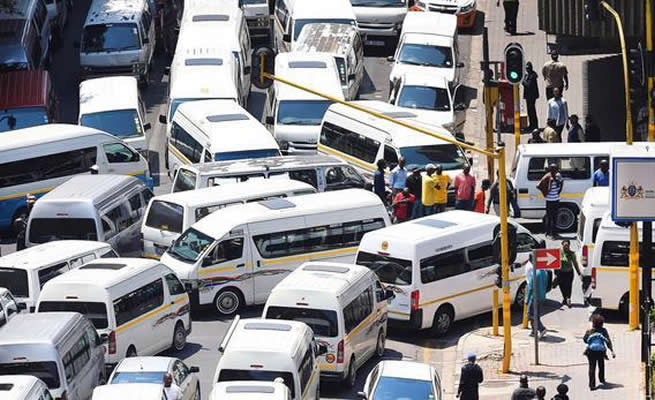Joburg’s Streets Turn into Taxi Ranks as Residents Cry for Help
JOHANNESBURG – A growing crisis of illegal taxi ranks is sweeping across Johannesburg, leaving residents and motorists frustrated and helpless. From the busy northern suburbs to the heart of Soweto, these unsanctioned ranks are steadily taking over the city's streets, blocking traffic, and creating unhygienic conditions that are turning neighbourhoods into hotspots of unlawful activity. This problem, which the city describes as a "moving target," is proving difficult to manage despite ongoing efforts by authorities.
In Fourways, a major northern suburb, taxis now line both sides of the Winnie Mandela Drive, a 2.7km stretch from Fourways Crossing down to Montecasino. They have taken over one lane on each side of the road, causing severe congestion. This disruption is not limited to just traffic; some drivers are even washing their taxis on this busy stretch, further blocking designated bus stops. The area has also attracted an influx of food vendors, who have set up shop along the road, adding to the chaos.
Soweto Residents Endure a "Stench of Urine"
The situation in Soweto is even more dire, as taxis have begun to encroach on residential premises, blocking driveways and leaving a trail of filth and disregard for city bylaws. In Molapo, residents say their neighbourhood has been transformed into a taxi rank following a dispute over routes between two rival associations earlier this year.
Bhekimuzi Masondo, a resident of Molapo, explained that the problem started when the Soweto Taxi Services (STS) accused the Nanduwe Taxi Association of stealing its customers. In retaliation, STS drivers began parking in residential streets to tout for passengers. The situation has become unbearable for locals who have to deal with the aftermath of these unlawful practices.
"They don’t clean up. They just leave their trash everywhere, and some even relieve themselves against our walls," Masondo said. "It hasn’t even been six months, and the stench of urine is already unbearable."
According to Masondo, the drivers operate in shifts, turning the quiet residential street into a 24-hour taxi rank. "There’s a morning shift, an afternoon shift, and even a night shift. They’ve practically turned our street into a taxi rank," he added.
For many residents, speaking up is not an option. Paulina Ntaka, another resident, said they feel powerless to act. "We are even afraid to report this issue because you know how violent taxi people are. If we speak up, it means we are putting our lives in danger," she lamented.
Beyond the unhygienic conditions, residents say the taxis have also worsened traffic congestion, particularly during peak hours. "In the mornings, when our children go to school and people rush to work, the taxis block the road and cause traffic," Ntaka added.
City Hall and JMPD Respond to Growing Problem
Johannesburg mayor Dada Morero has pleaded with taxi owners to take responsibility for the issue. "I want to ask taxi associations to deal with illegal ranks in the city. We can’t have ranks just being established everywhere,” Morero said.
The Johannesburg Metropolitan Police Department (JMPD) spokesperson, Xolani Fihla, confirmed the widespread nature of the problem, describing illegal taxi ranks as a "moving target." He said the JMPD, along with other departments, conducts ongoing operations to shut them down.
Fihla gave an example of a recent operation. "For example, on September 2, the JMPD Transportation Unit shut down an illegal taxi rank at Simmonds and Rahima Moosa streets in the [Johannesburg] CBD." However, a day after the operation, a reporter from the Sowetan found that taxis were still lining the road.
According to the JMPD, the challenges posed by illegal taxi ranks are numerous. They include the obstruction of traffic lanes, which causes severe congestion, and safety risks from the unsanctioned loading and offloading of passengers. The illegal ranks also lead to widespread littering, illegal trading, and a general disregard for city bylaws. Many of the vehicles operating from these ranks are often unroadworthy and lack the proper operating permits. Furthermore, the lack of basic facilities such as shelters, lighting, and ablution facilities creates unhygienic conditions for both drivers and passengers.
Fihla noted that these illegal ranks are often concentrated in high-traffic areas, with Witkoppen Road, Winnie Mandela Drive in Fourways, and parts of the inner city being recent hotspots. In Honeydew, at the intersection of Christian de Wet Road and Beyers Naudé Drive, taxis have taken over an open piece of land, turning it into an informal rank without any authorisation.
Taxi Association Says Community Needs Come First
In a statement that reflects the complex relationship between taxi associations and the community, STS spokesperson John Ximba acknowledged the illegal parking by his drivers but denied that it was a major disruption to residents' lives.
"Yes, we are aware that this may affect the residents somehow, but it’s them who need the taxis. We did not bring these taxis to just park, we transport people," he said.
Ximba denied any knowledge of drivers urinating or causing traffic congestion, stating that his focus was on the community’s needs. “We are not aware that people pee or cause traffic but what we are aware of is the community needs,” he said. "We and these residents need to have a relationship and discuss this. The area is always busy, it is not us who are causing traffic."
Despite the city’s pleas and the residents' distress, the issue of illegal taxi ranks continues to grow, leaving many wondering what it will take to restore order to Johannesburg’s streets.

Follow Us on Twitter











